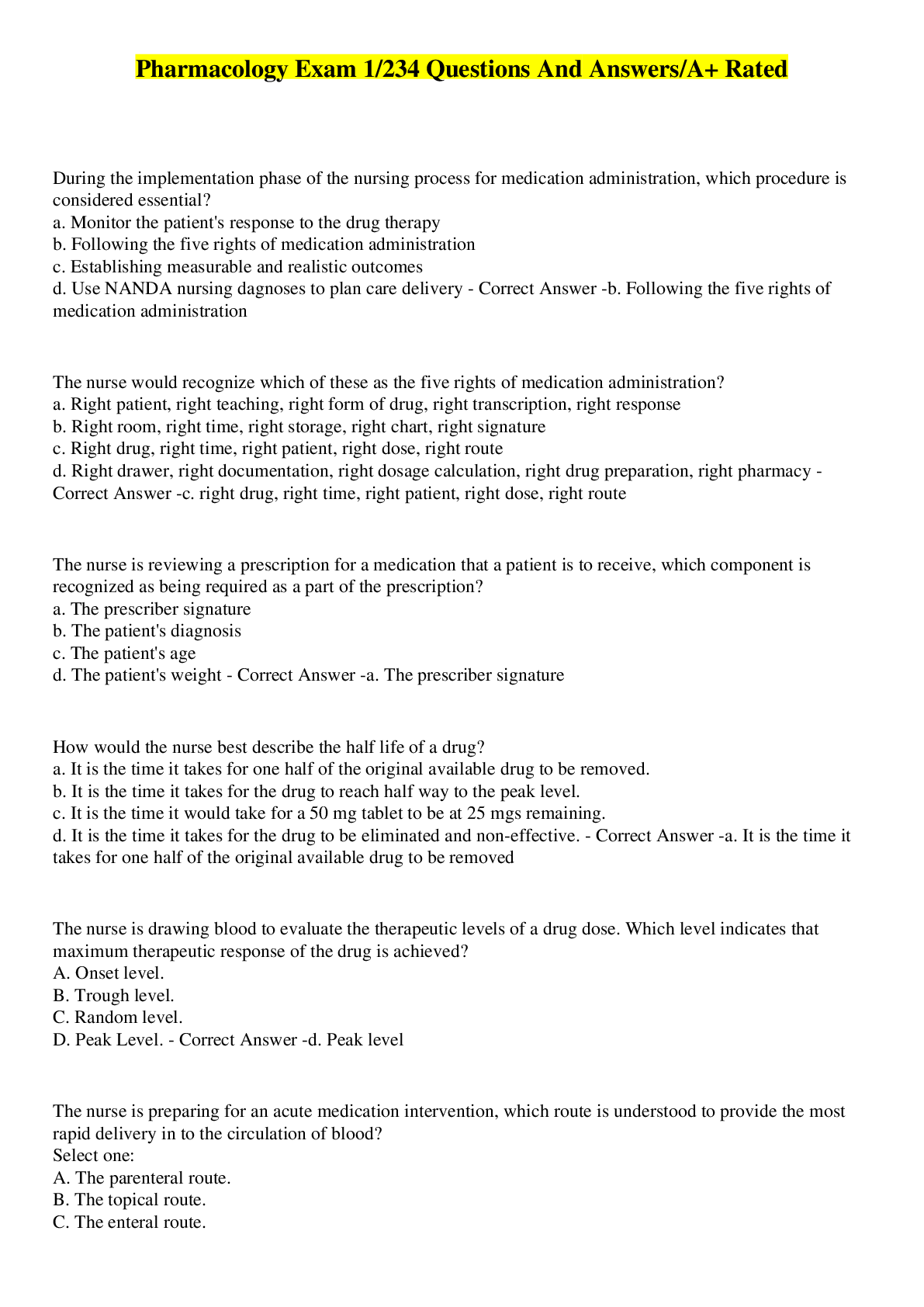*NURSING > EXAM > NR 508 Advanced Pharmacology Week 2 quiz (Fall 2019) – Chamberlain College of Nursing / NR508 Adva (All)
NR 508 Advanced Pharmacology Week 2 quiz (Fall 2019) – Chamberlain College of Nursing / NR508 Advanced Pharmacology Week 2 quiz (Fall 2019)
Document Content and Description Below
NR 508 Advanced Pharmacology Week 2 quiz (Fall 2019) – Chamberlain College of Nursing 1. A patient who has stable angina and uses sublingual nitroglycerin tablets is in the clinic and begins hav... ing chest pain. The primary care NP administers a nitroglycerin tablet and instructs the patient to lie down. The NP’s next action should be to: (Points : 2) obtain an electrocardiogram. administer oxygen at 2 L/minute. give 325 mg of chewable aspirin. call EMS. Question 2.2. A patient has been taking levothyroxine 100 mcg daily for several months. The patient comes to the clinic with complaints of insomnia and irritability. The primary care NP notes a heart rate of 92 beats per minute. The NP should: (Points : 2) change to liothyronine 75 mcg/day. discontinue levothyroxine indefinitely. order propylthiouracil to counter the increased thyroid levels. order TSH and T4 levels and decrease the dose to 75 mcg/day. Question 3.3. A 55-year-old patient with no prior history of hypertension has a blood pressure greater than 140/90 on three separate occasions. The patient does not smoke, has a body mass index of 24, and exercises regularly. The patient has no known risk factors for cardiovascular disease. The primary care NP should: (Points : 2) prescribe a thiazide diuretic and an angiotensin-converting enzyme inhibitor. perform a careful cardiovascular physical assessment. counsel the patient about dietary and lifestyle changes. order a urinalysis and creatinine clearance and begin therapy with a -blocker. Question 4.4. A 75-year-old patient who has cardiovascular disease reports insomnia and vomiting for several weeks. The primary care NP orders thyroid function tests. The tests show TSH is decreased and T4 is increased. The NP should consult with an endocrinologist and order: (Points : 2) thyrotropin. methimazole. levothyroxine. propylthiouracil. Question 5.5. A patient with primary hypercholesterolemia is taking an HMG-CoA reductase inhibitor. All of the patient’s baseline LFTs were normal. At a 6-month follow-up visit, the patient reports occasional headache. A lipid profile reveals a decrease of 20% in the patient’s LDL cholesterol. The NP should: (Points : 2) order LFTs. order CK-MM tests. consider decreasing the dose of the medication. reassure the patient that this side effect is common. Question 6.6. A patient who has type 2 diabetes mellitus will begin taking a bile acid sequestrant. Which bile acid sequestrant should the primary care NP order? (Points : 2) Colesevelam (Welchol) Colestipol (Colestid) Cholestyramine (Questran) Cholestyramine (Questran Light) Question 7.7. A patient with Graves’ disease is taking methimazole. After 6 months of therapy, the primary care NP notes normal T3 and T4 and elevated TSH. The NP should: (Points : 2) order a complete blood count (CBC) with differential. order aspartate aminotransferase, AGT, and LDH tests. decrease the dose of the medication. add levothyroxine to the patient’s regimen. Question 8.8. A patient who has type 2 diabetes mellitus takes metformin (Glucophage). The patient tells the primary care NP that he will have surgery in a few weeks. The NP should recommend: (Points : 2) taking the metformin dose as usual the morning of surgery. using insulin during the perioperative and postoperative periods. that the patient stop taking metformin several days before surgery. adding a sulfonylurea medication until recovery from surgery is complete. Question 9.9. A child who has congenital hypothyroidism takes levothyroxine 75 mcg/day. The child weighs 15 kg. The primary care NP sees the child for a 3-year-old check-up. The NP should consult with a pediatric endocrinologist to discuss: (Points : 2) increasing the dose to 90 mcg/day. decreasing the dose to 30 mcg/day. stopping the medication and checking TSH and T4 in 4 weeks. discussing the need for lifetime replacement therapy with the child’s parents. Question 10.10. A patient who is newly diagnosed with type 2 diabetes mellitus has not responded to changes in diet or exercise. The patient is mildly obese and has a fasting blood glucose of 130 mg/dL. The patient has normal renal function tests. The primary care NP plans to prescribe a combination product. Which of the following is indicated for this patient? (Points : 2) Metformin/glyburide (Glucovance) Insulin and metformin (Glucophage) Saxagliptin/metformin (Kombiglyze) Metformin/pioglitazone (ACTOplus met) Question 11.11. An 80-year-old male patient will begin taking an -antiadrenergic medication. The primary care NP should teach this patient to: (Points : 2) ask for assistance while bathing. restrict fluids to aid with diuresis. take the medication in the morning with food. be aware that priapism is a common side effect. Question 12.12. A primary care NP prescribes levothyroxine for a patient to treat thyroid deficiency. When teaching this patient about the medication, the NP should: (Points : 2) counsel the patient to take the medication with food. tell the patient that changing brands of the medication should be avoided. instruct the patient to stop taking the medication if signs of thyrotoxicosis occur. tell the patient that the drug may be stopped when thyroid function tests stabilize. Question 13.13. A 40-year-old patient is in the clinic for a routine physical examination. The patient has a body mass index (BMI) of 26. The patient is active and walks a dog daily. A lipid profile reveals low-density lipoprotein (LDL) of 100 mg/dL, high-density lipoprotein (HDL) of 30 mg/dL, and triglycerides of 250 mg/dL. The primary care nurse practitioner (NP) should: (Points : 2) order a fasting plasma glucose level. consider prescribing metformin (Glucophage). suggest dietary changes and increased exercise. obtain serum insulin and hemoglobin A1c levels. Question 14.14. A patient has three consecutive blood pressure readings of 140/95 mm Hg. The patient’s body mass index is 24. A fasting plasma glucose is 100 mg/dL. Creatinine clearance and cholesterol tests are normal. The primary care NP should order: (Points : 2) a -blocker. an angiotensin-converting enzyme inhibitor. a thiazide diuretic. dietary and lifestyle changes. Question 15.15. A patient who has stable angina pectoris and a history of previous myocardial infarction takes nitroglycerin and verapamil. The patient asks the primary care nurse practitioner (NP) why it is necessary to take verapamil. The NP should tell the patient that verapamil: (Points : 2) improves blood flow and oxygen delivery to the heart. increases the rate of contraction of the cardiac muscle. increases the force of contraction of the cardiac muscle. has a positive inotropic effect to increase cardiac output. Question 16.16. A primary care NP prescribes a nitroglycerin transdermal patch, 0.4 mg/hour release, for a patient with chronic stable angina. The NP should teach the patient to: (Points : 2) change the patch four times daily. use the patch as needed for angina pain. use two patches daily and change them every 12 hours. apply one patch daily in the morning and remove in 12 hours. Question 17.17. A 55-year-old woman has a history of myocardial infarction (MI). A lipid profile reveals LDL of 130 mg/dL, HDL of 35 mg/dL, and triglycerides 150 mg/dL. The woman is sedentary with a body mass index of 26. The woman asks the primary care NP about using a statin medication. The NP should: (Points : 2) recommend dietary and lifestyle changes first. begin therapy with atorvastatin 10 mg per day. discuss quality-of-life issues as part of the decision to begin medication. tell her there is no clinical evidence of efficacy of statin medication in her case. Question 18.18. A primary care NP orders thyroid function tests. The patient’s TSH is 1.2 microunits/mL, and T4 is 1.7 ng/mL. The NP should: (Points : 2) assess the patient for symptoms of hyperthyroidism. ask the patient about the use of medications such as lithium. tell the patient that the results most likely indicate hypothyroidism. ask an endocrinologist to evaluate for possible Hashimoto’s thyroiditis. Question 19.19. A patient who takes a calcium channel blocker is in the clinic for an annual physical examination. The cardiovascular examination is normal. As part of routine monitoring for this patient, the primary care NP should evaluate: (Points : 2) serum calcium channel blocker level. complete blood count and electrolytes. liver function tests (LFTs) and renal function. thyroid and insulin levels. Question 20.20. A patient who takes nitroglycerin for stable angina pectoris develops hypertension. The primary care NP should contact the patient’s cardiologist to discuss adding: (Points : 2) amlodipine (Norvasc). diltiazem (Cardizem). verapamil HCl (Calan). nifedipine (Procardia XL). Question 21.21. A patient who has had a previous myocardial infarction has a blood pressure of 135/82 mm Hg. The patient’s body mass index is 28, and the patient has a fasting plasma glucose of 105 mg/dL. The primary care NP should prescribe: (Points : 2) an angiotensin-converting enzyme inhibitor. a thiazide diuretic. lifestyle modifications. a calcium-channel blocker. Question 22.22. A patient who has hypothyroidism has been taking levothyroxine 50 mcg daily for 2 weeks. The patient reports continued fatigue. The primary care NP should: (Points : 2) order a T4 level today. increase the dose to 100 mcg. check the TSH level in 1 week. reassure the patient that this will improve in several weeks. Question 23.23. A 30-year-old white woman has a BMI of 26 and weighs 150 lb. At an annual physical examination, the patient’s fasting plasma glucose is 130 mg/dL. The patient walks 1 mile three or four times weekly. She has had two children who weighed 7 lb and 8 lb at birth. Her personal and family histories are noncontributory. The primary care NP should: (Points : 2) order metformin (Glucophage). order a lipid profile, complete blood count, and liver function tests (LFTs). order an oral glucose tolerance test. set a weight loss goal of 10 to 15 lb. Question 24.24. A primary care NP sees a 46-year-old male patient and orders a fasting lipoprotein profile that reveals LDL of 190 mg/dL, HDL of 40 mg/dL, and triglycerides of 200 mg/dL. The patient has no previous history of coronary heart disease, but the patient’s father developed coronary heart disease at age 55 years. The NP should prescribe: (Points : 2) atorvastatin (Lipitor). gemfibrozil (Lopid). cholestyramine (Questran). lovastatin/niacin (Advicor). Question 25.25. An African-American patient who is obese has persistent blood pressure readings greater than 150/95 mm Hg despite treatment with a thiazide diuretic. The primary care NP should consider prescribing a(n): (Points : 2) angiotensin receptor blocker. -blocker. ACE inhibitor. calcium channel blocker. [Show More]
Last updated: 1 year ago
Preview 1 out of pages

Reviews( 0 )
Document information
Connected school, study & course
About the document
Uploaded On
Jun 02, 2020
Number of pages
Written in
Additional information
This document has been written for:
Uploaded
Jun 02, 2020
Downloads
0
Views
19

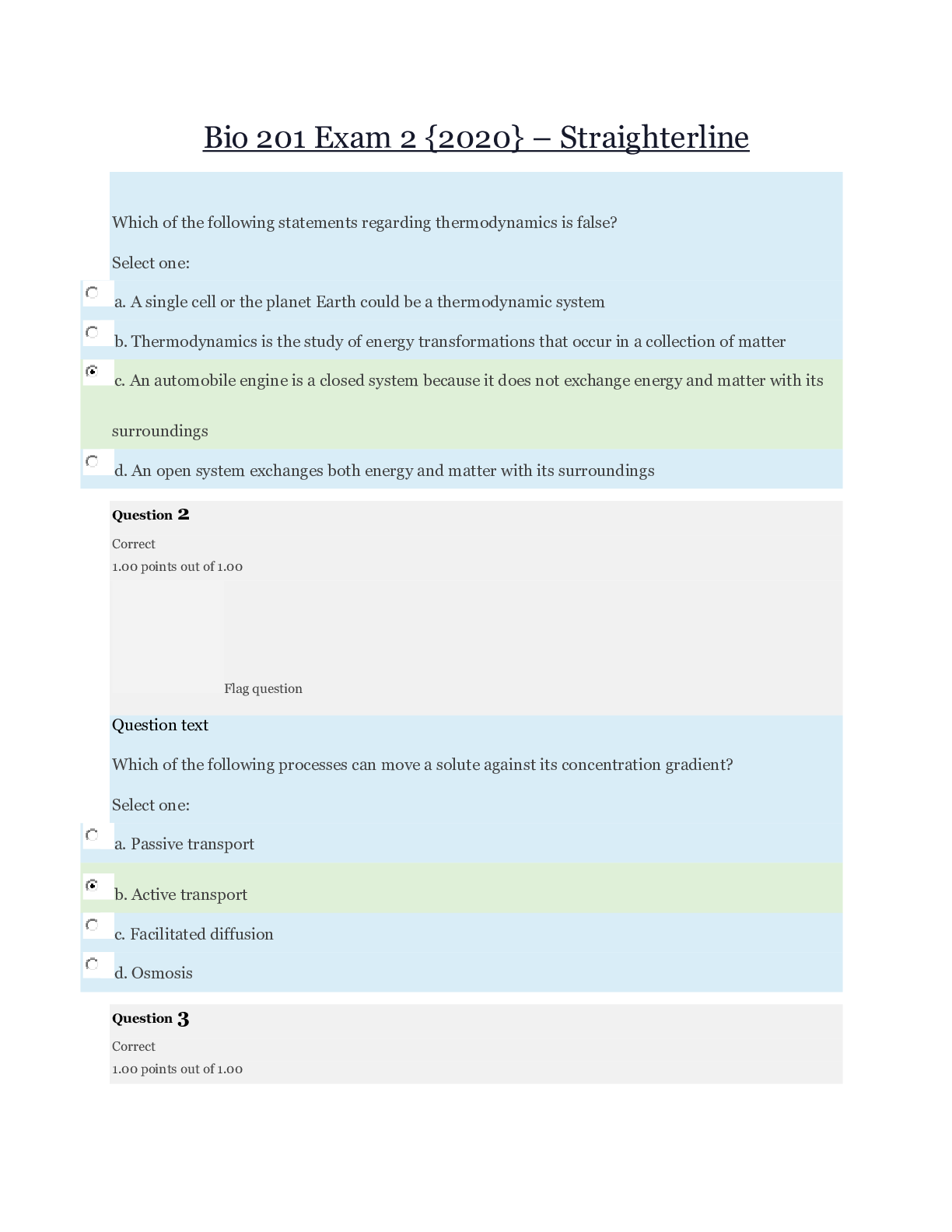
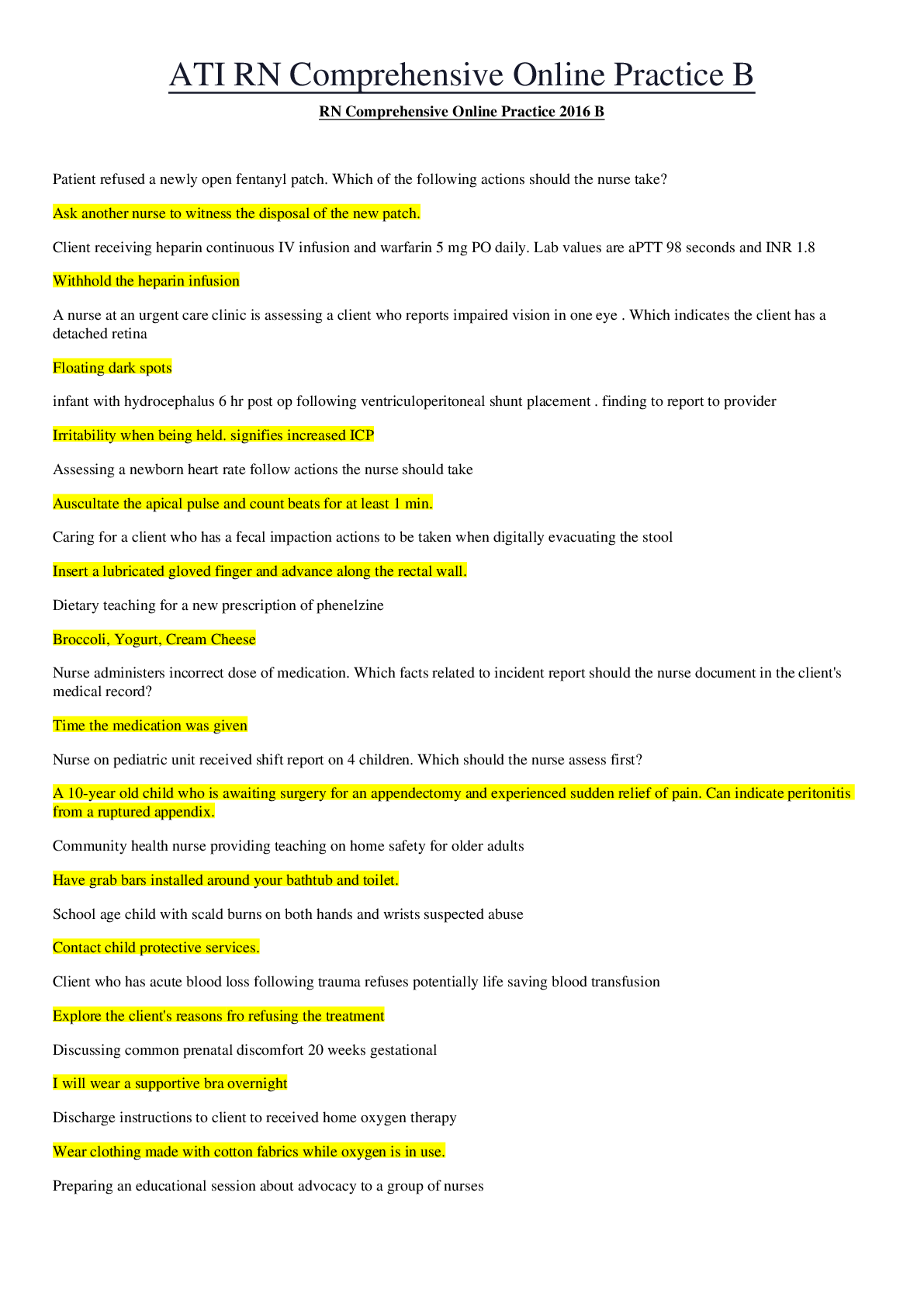
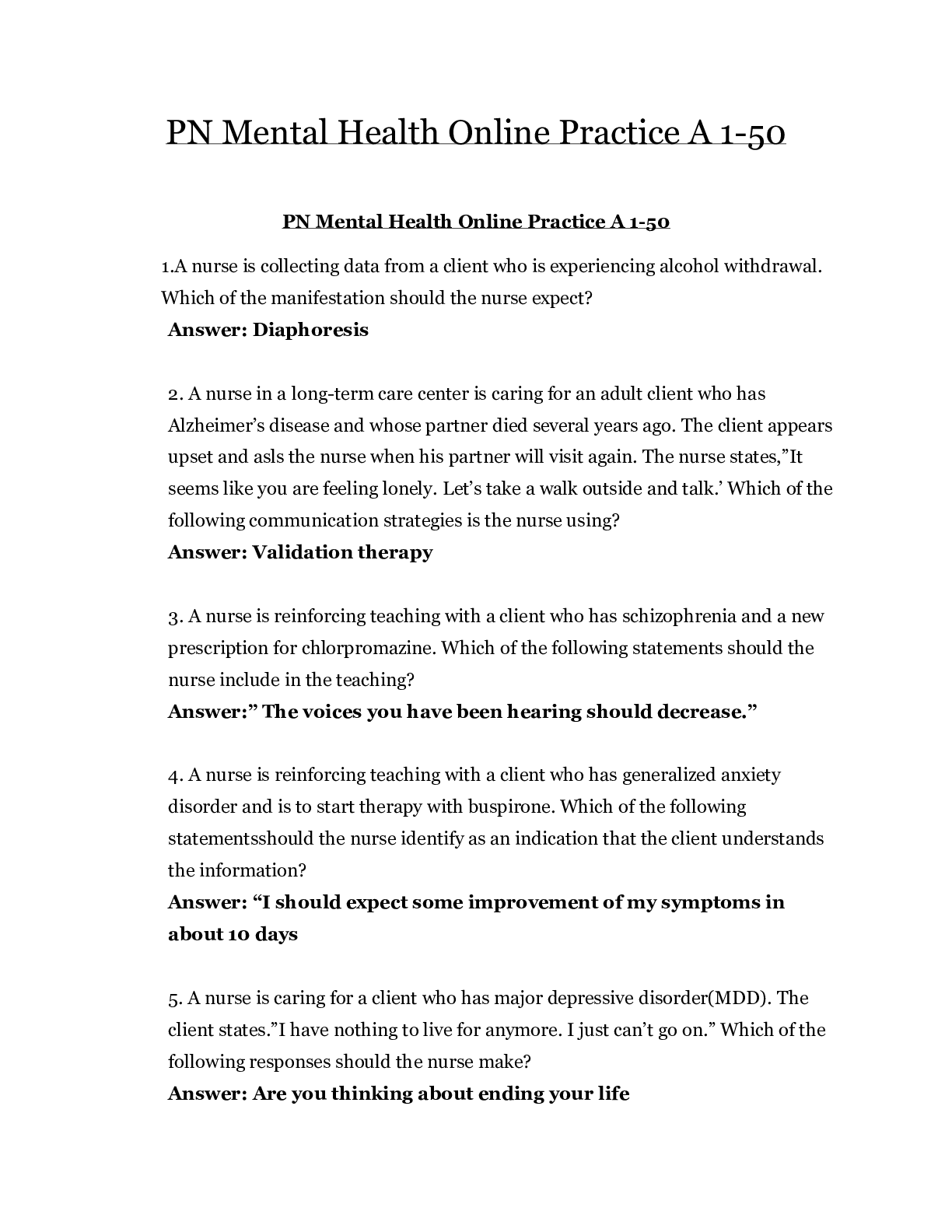
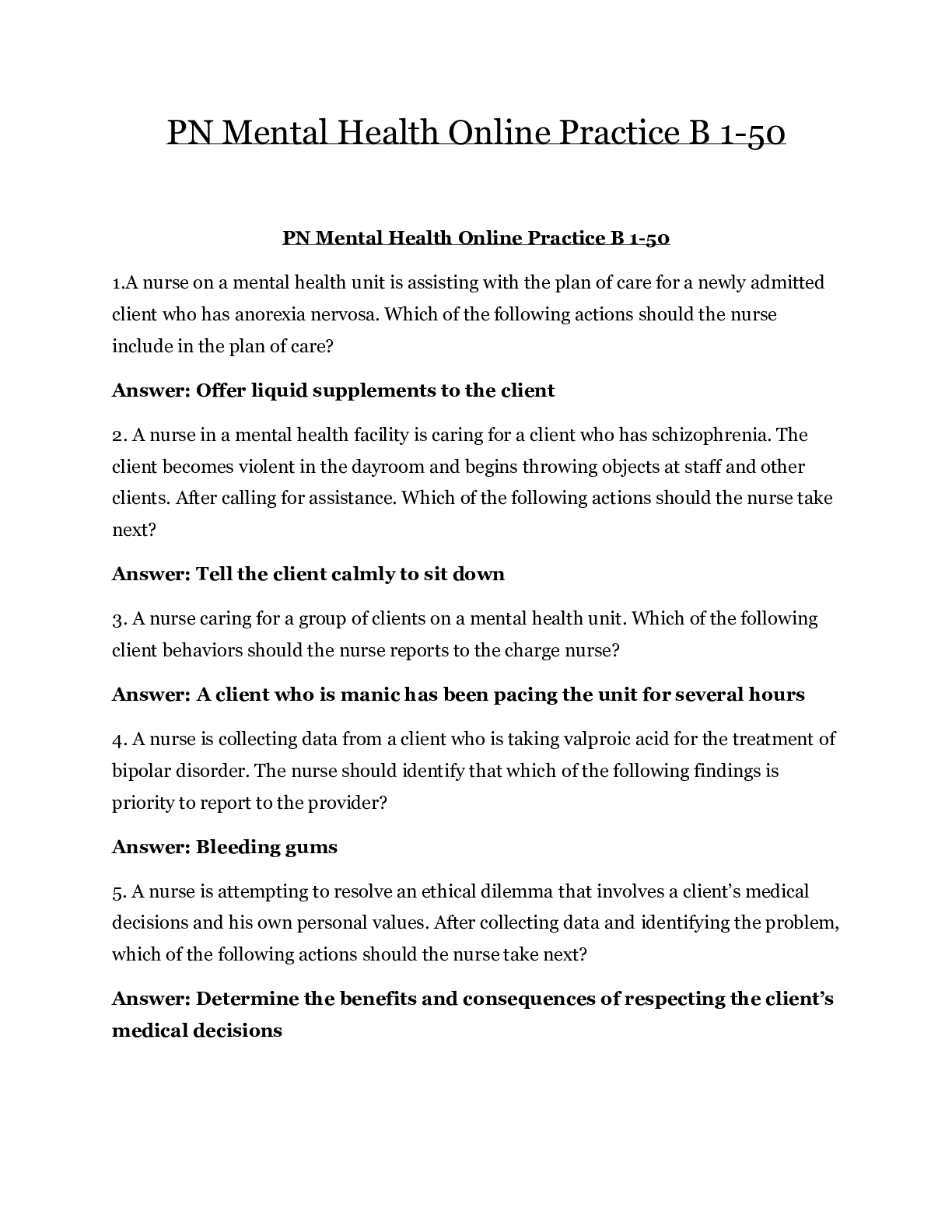
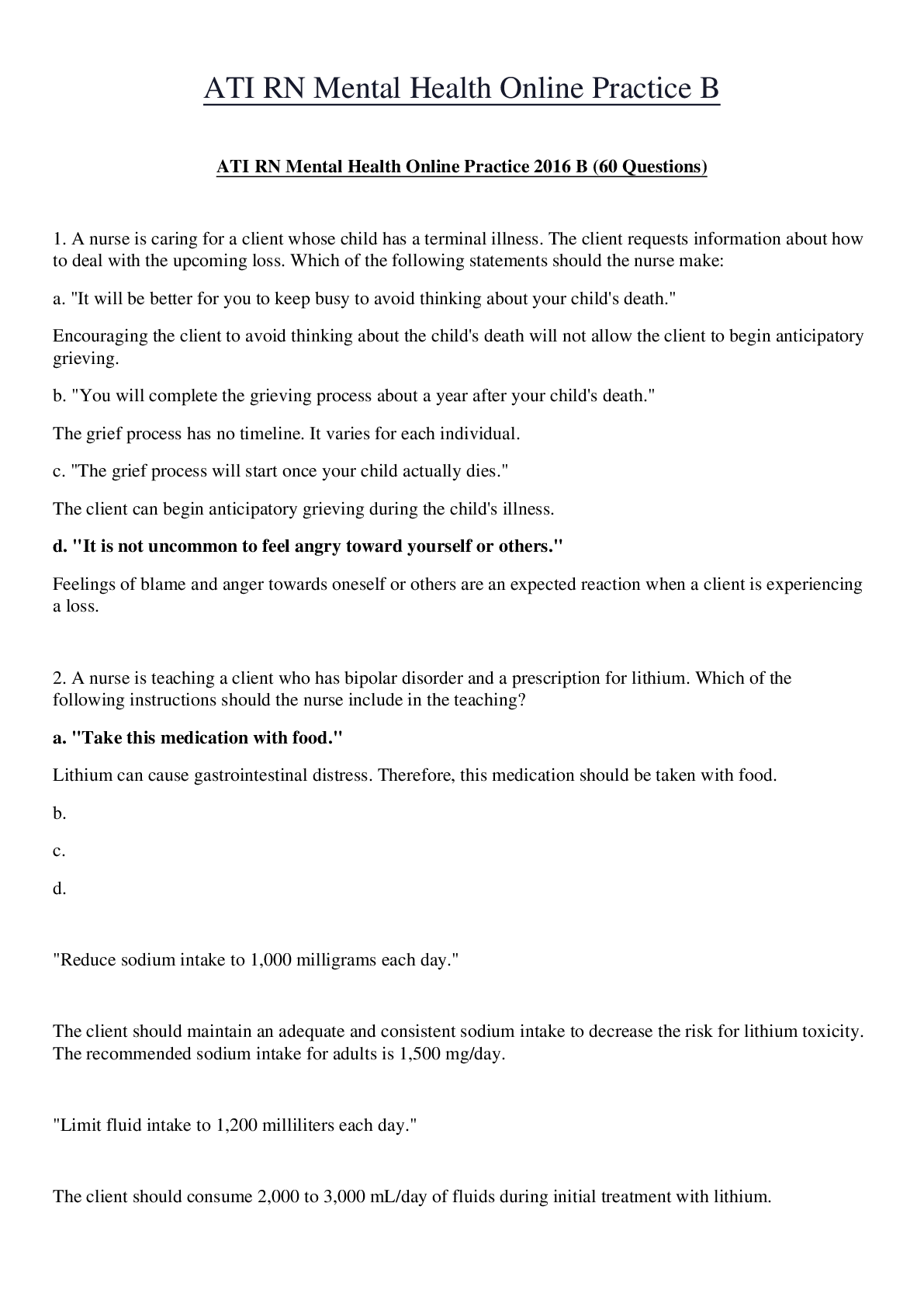
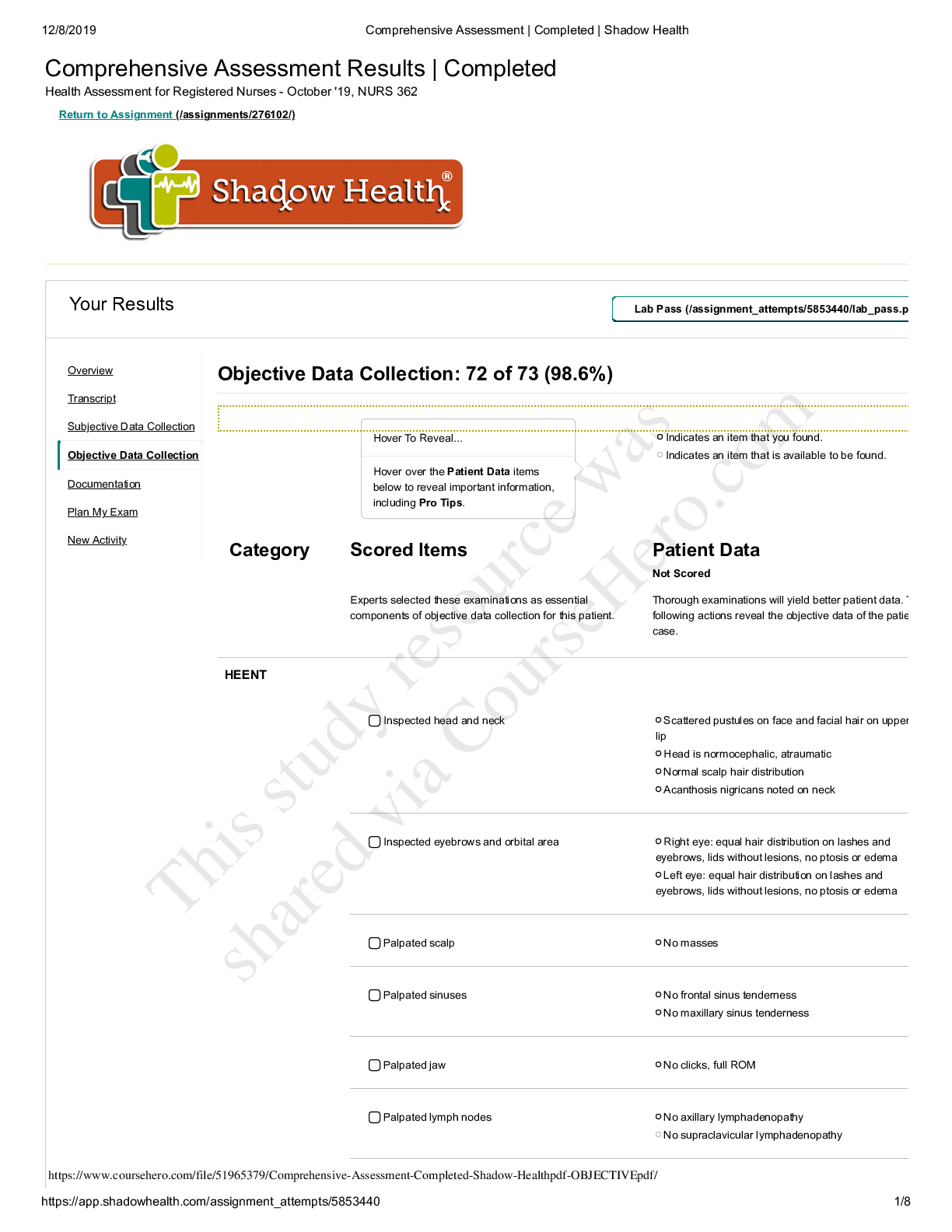

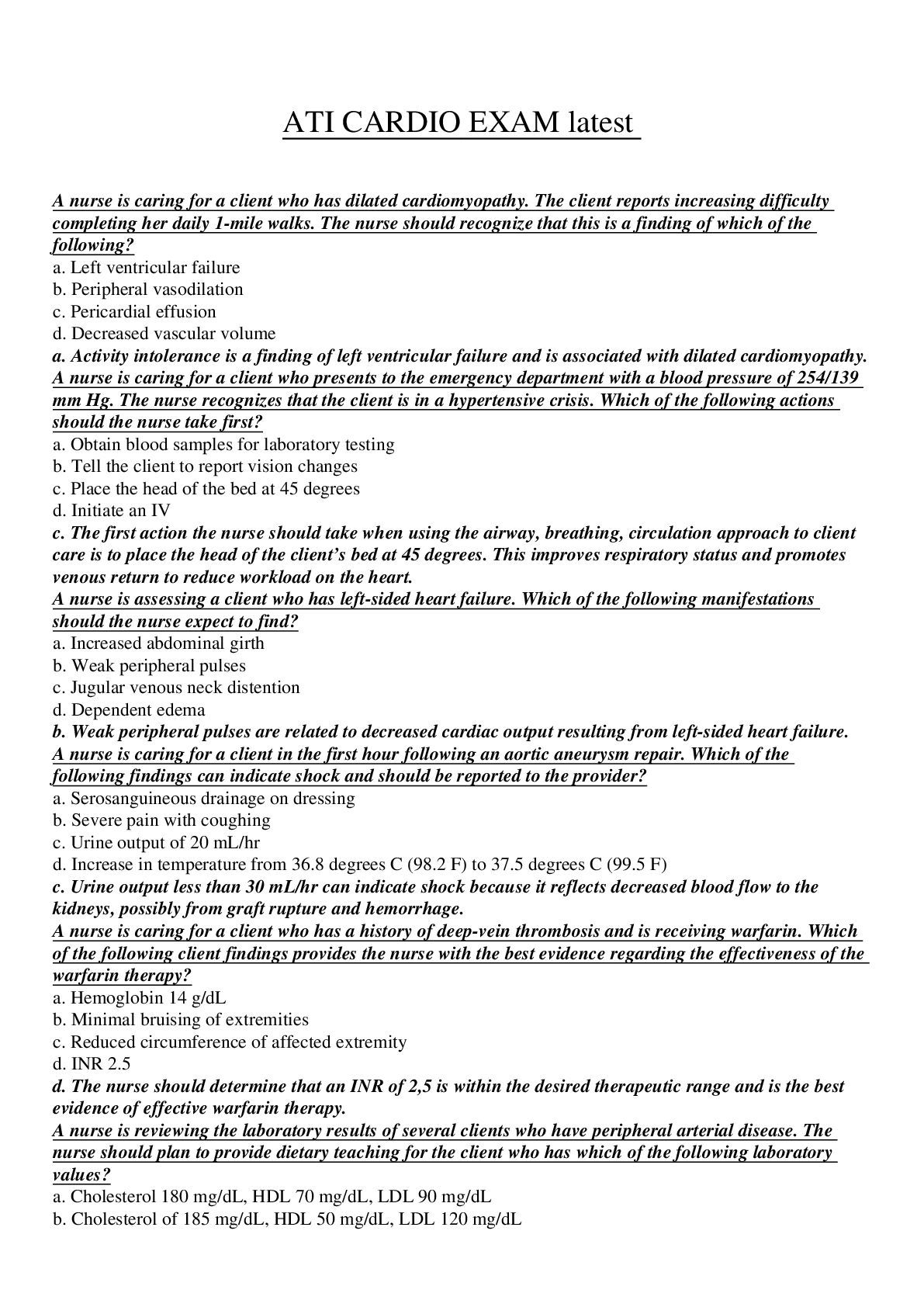
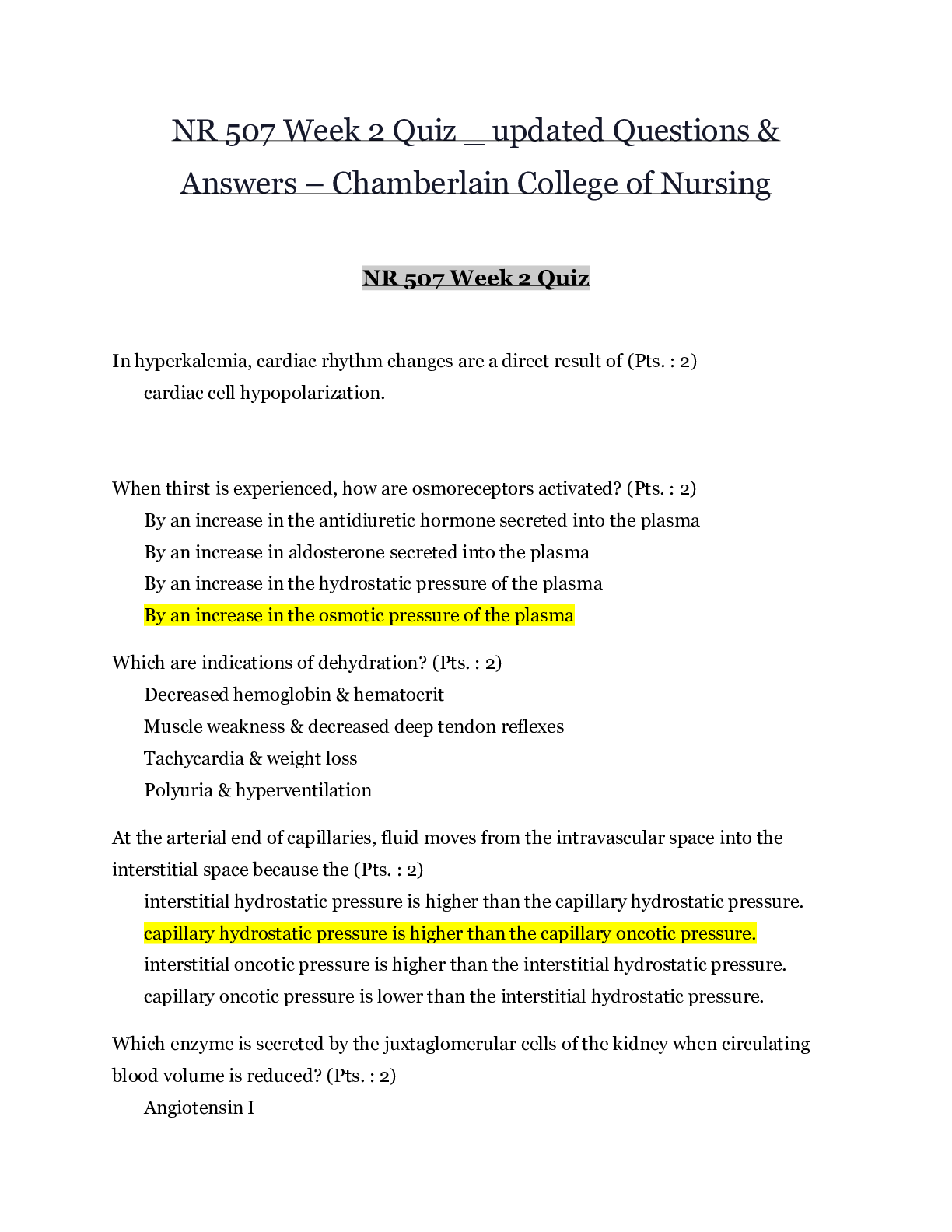
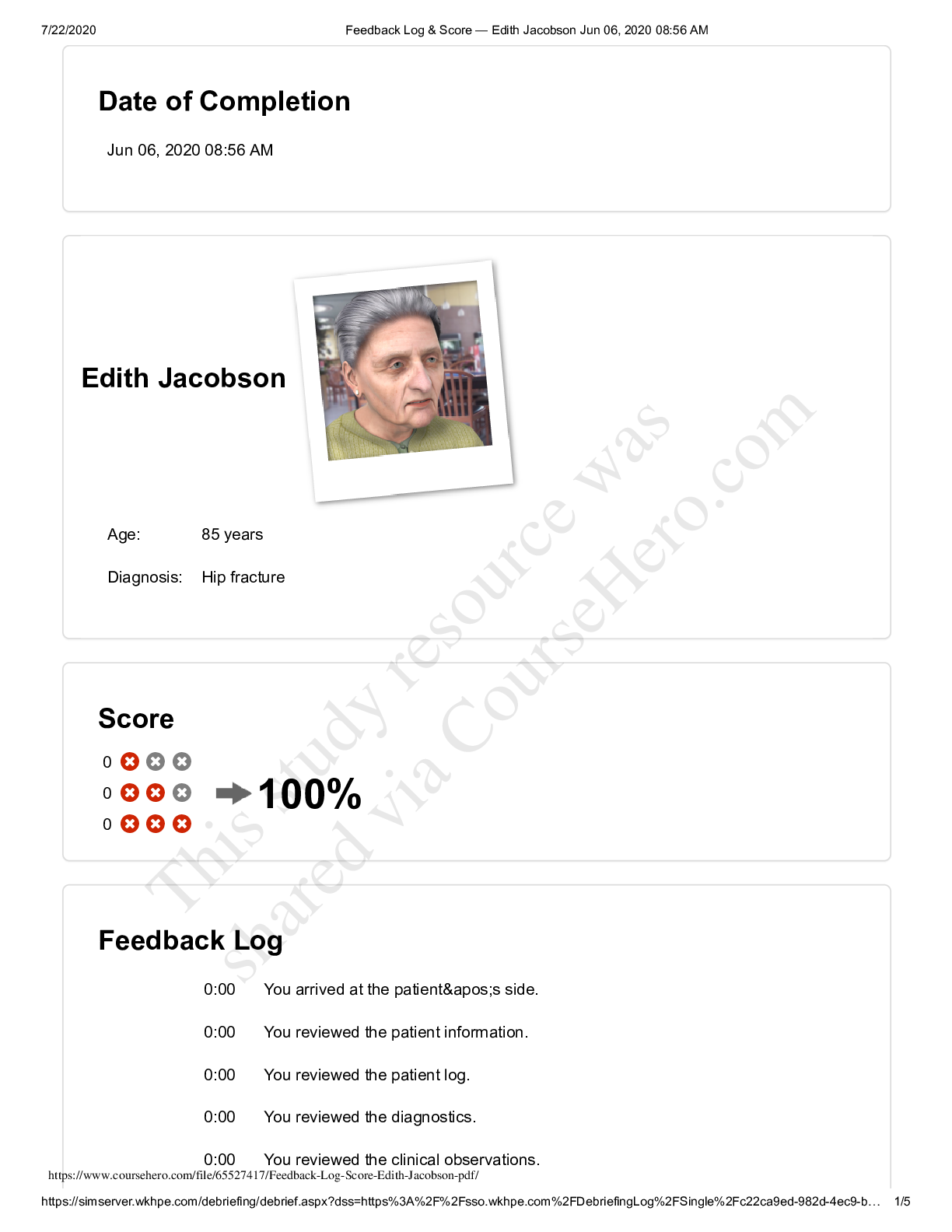
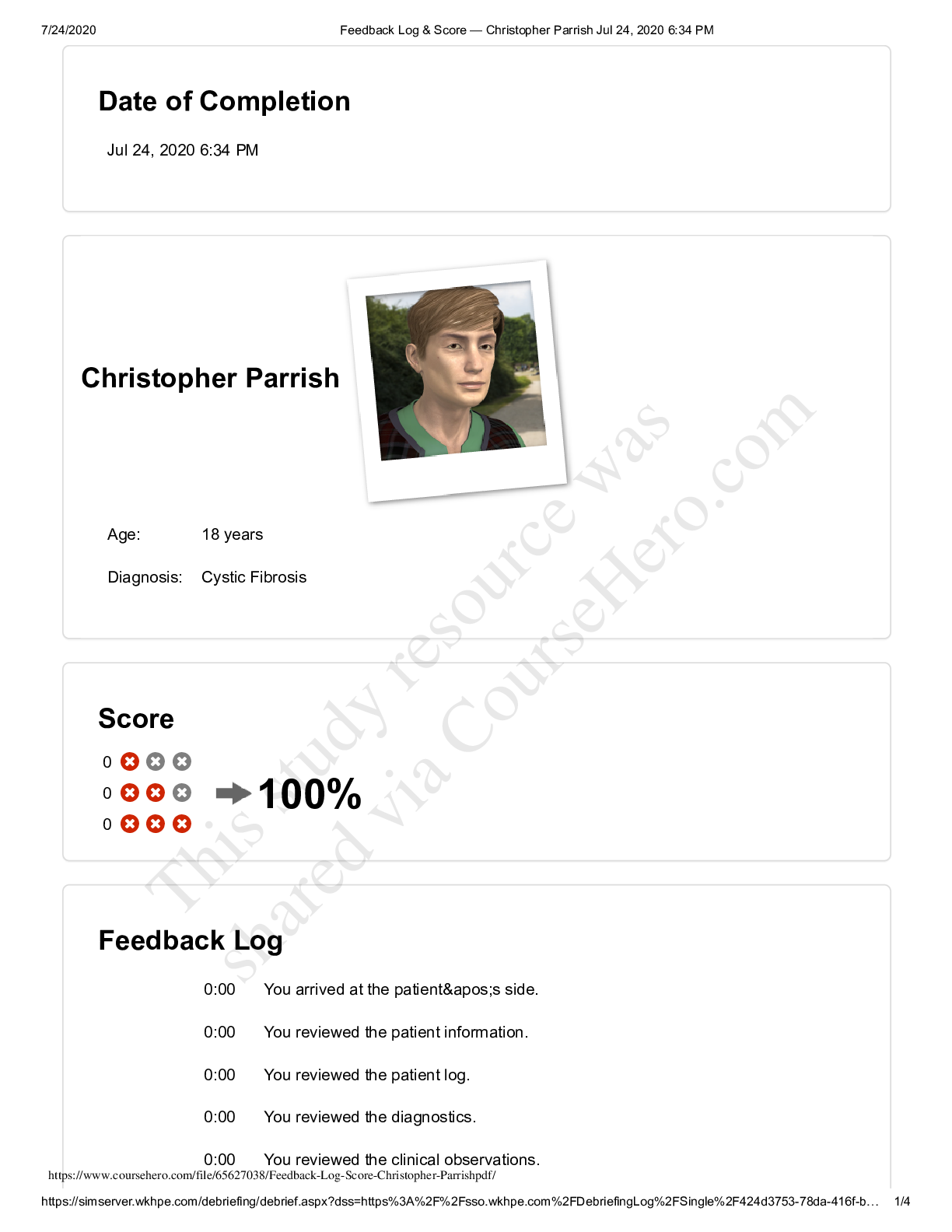
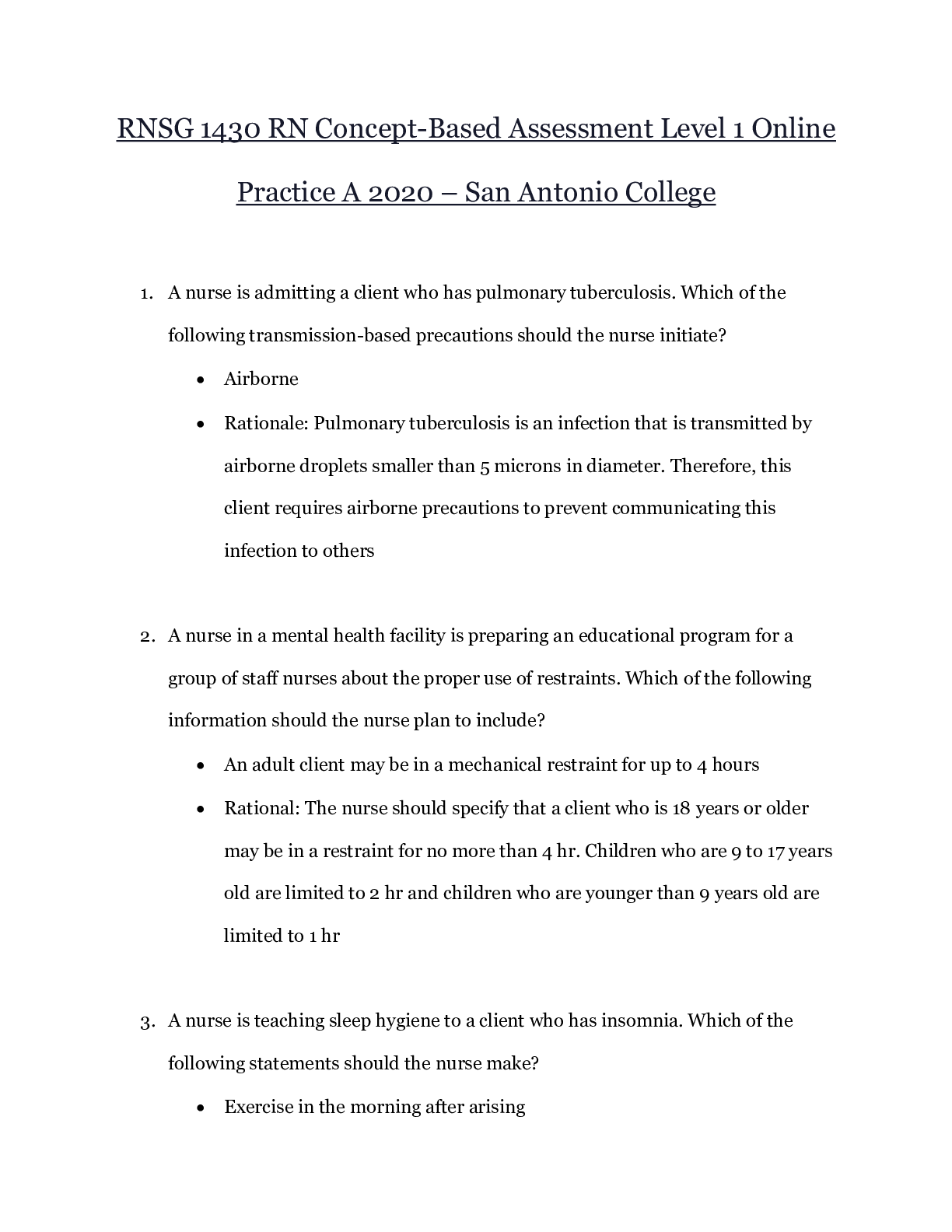
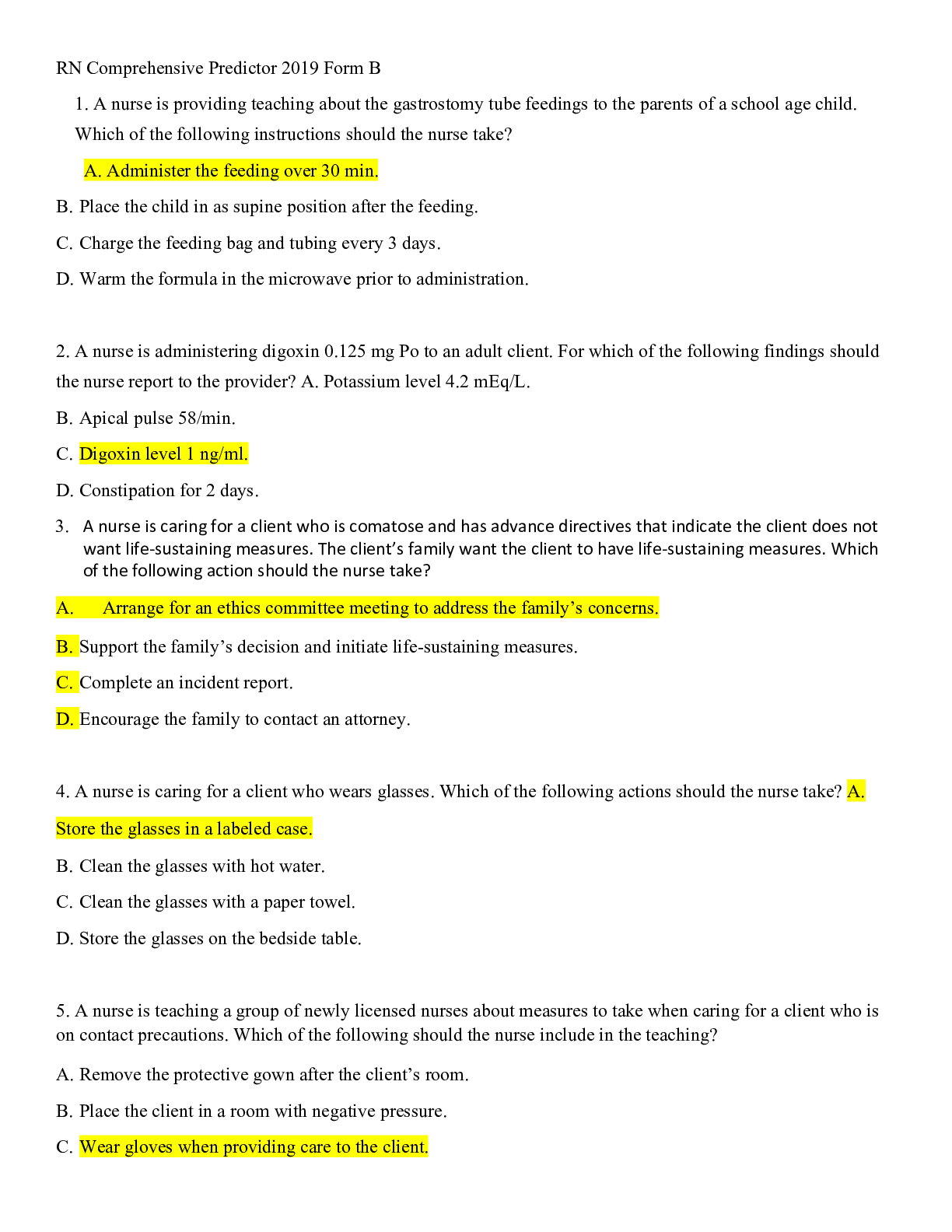

 – CHAMBERLAIN COLLEGE OF NURSING.png)
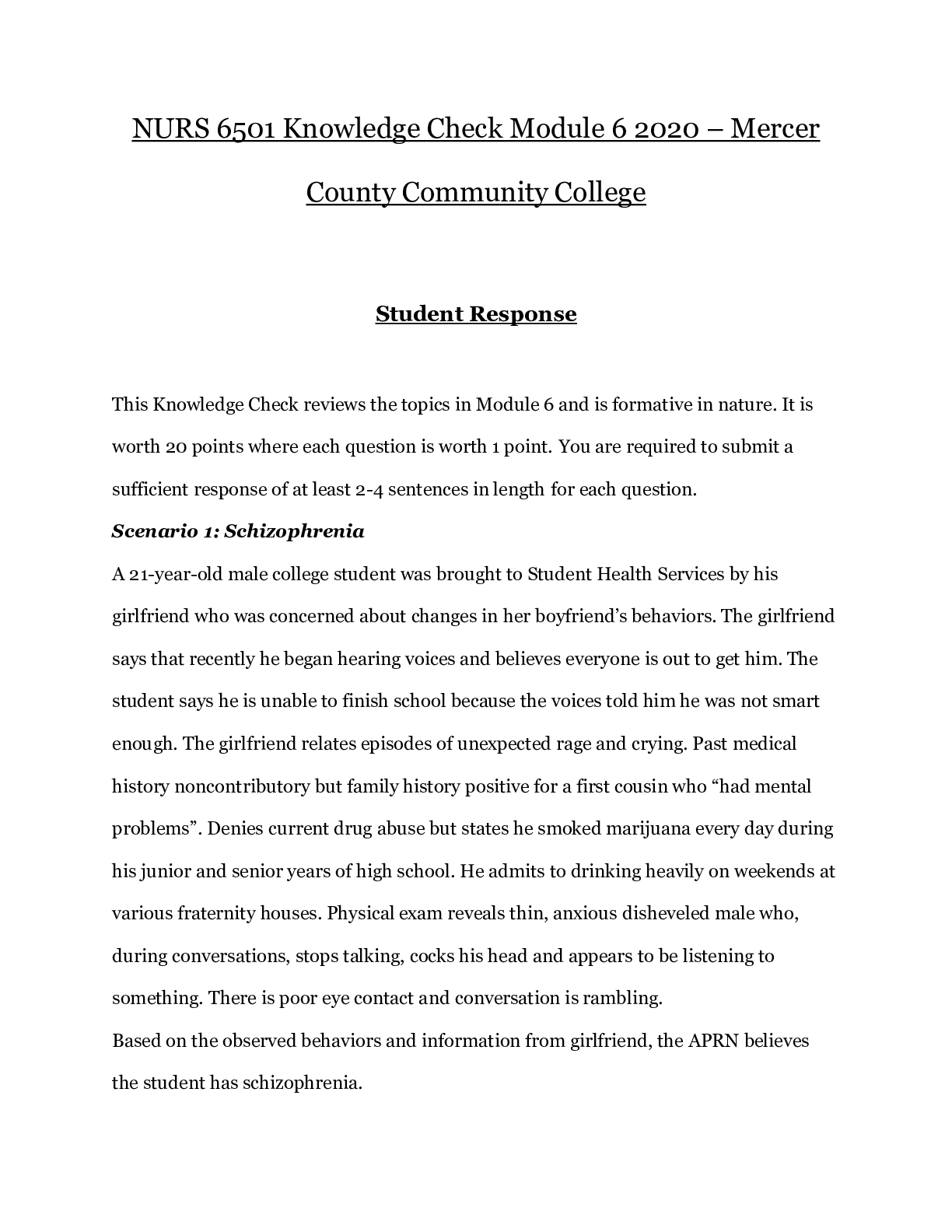
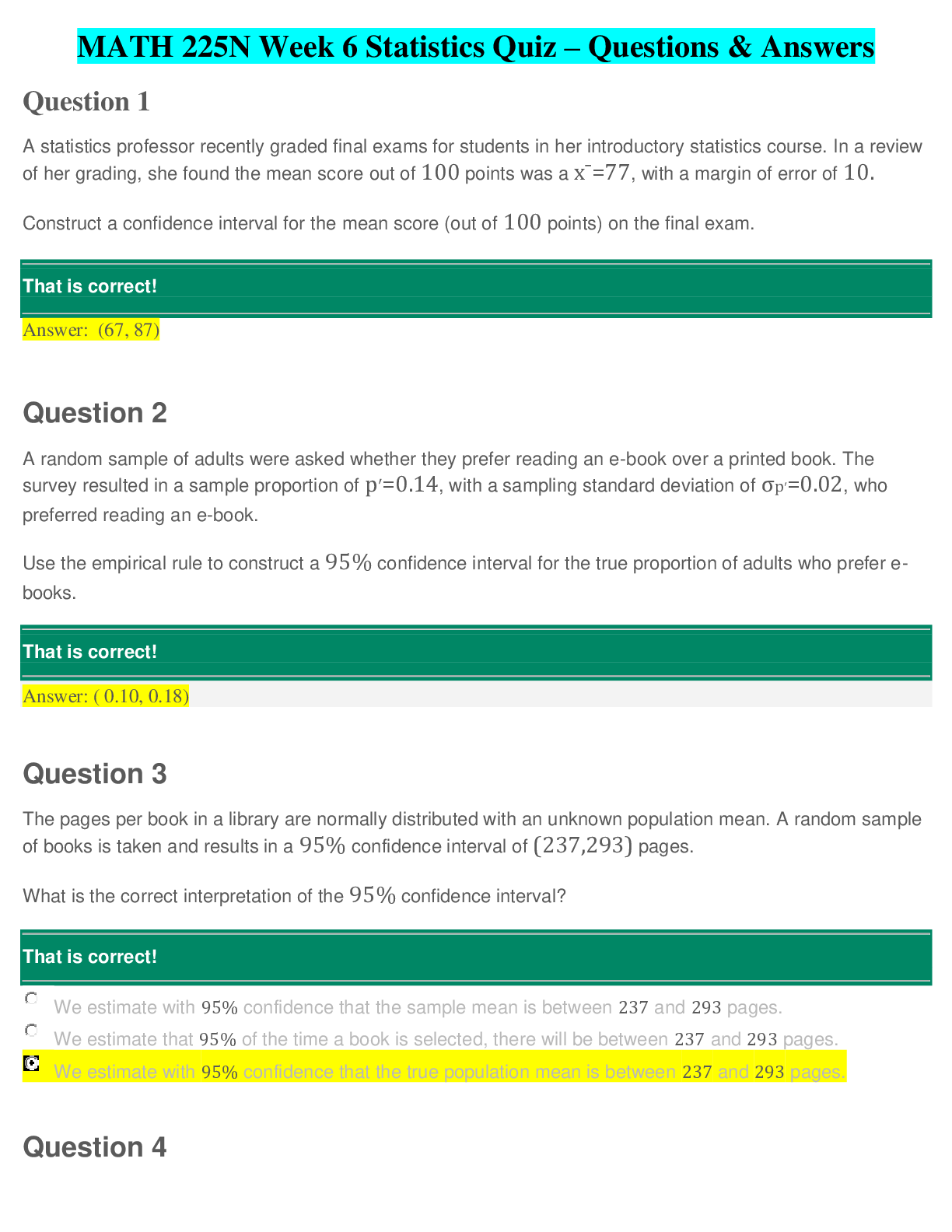

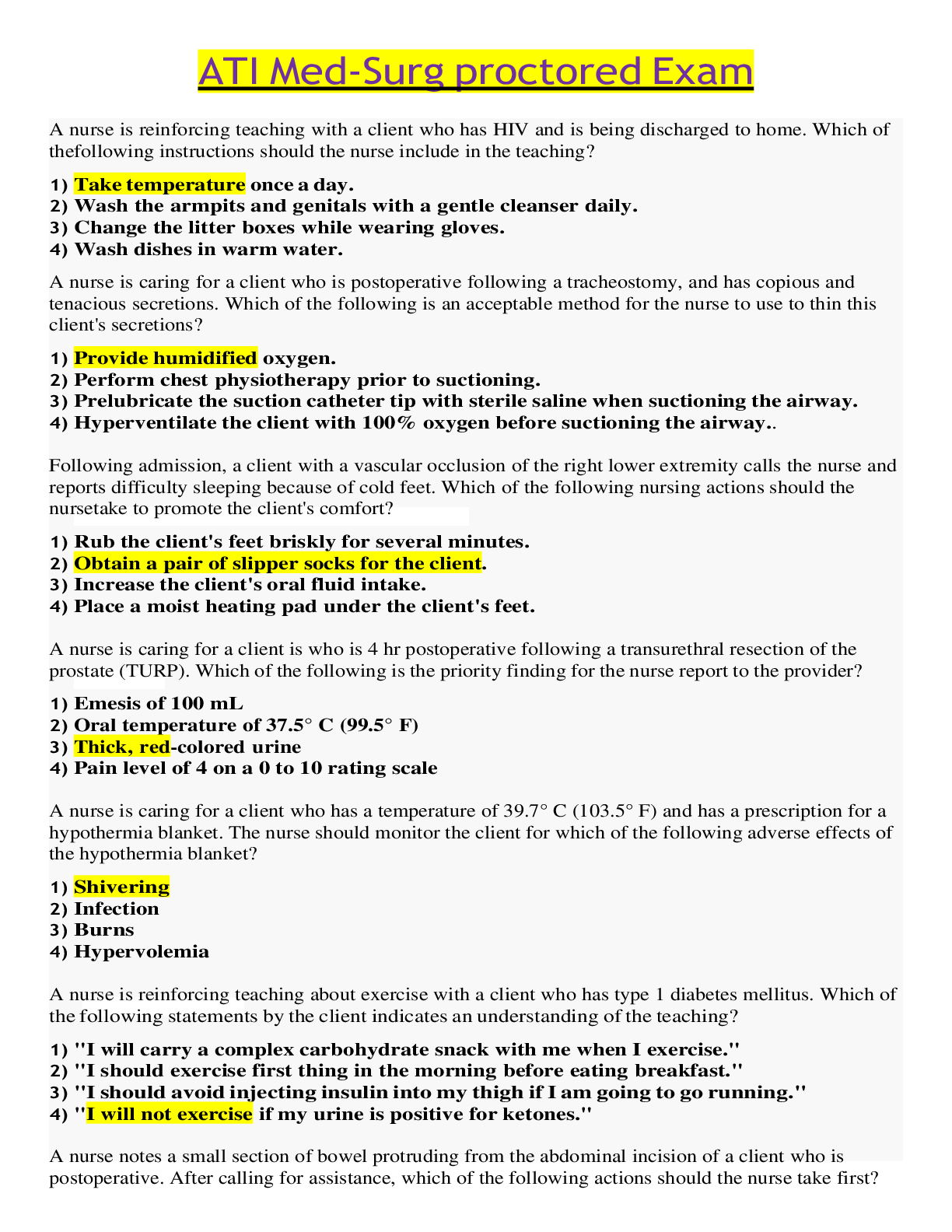
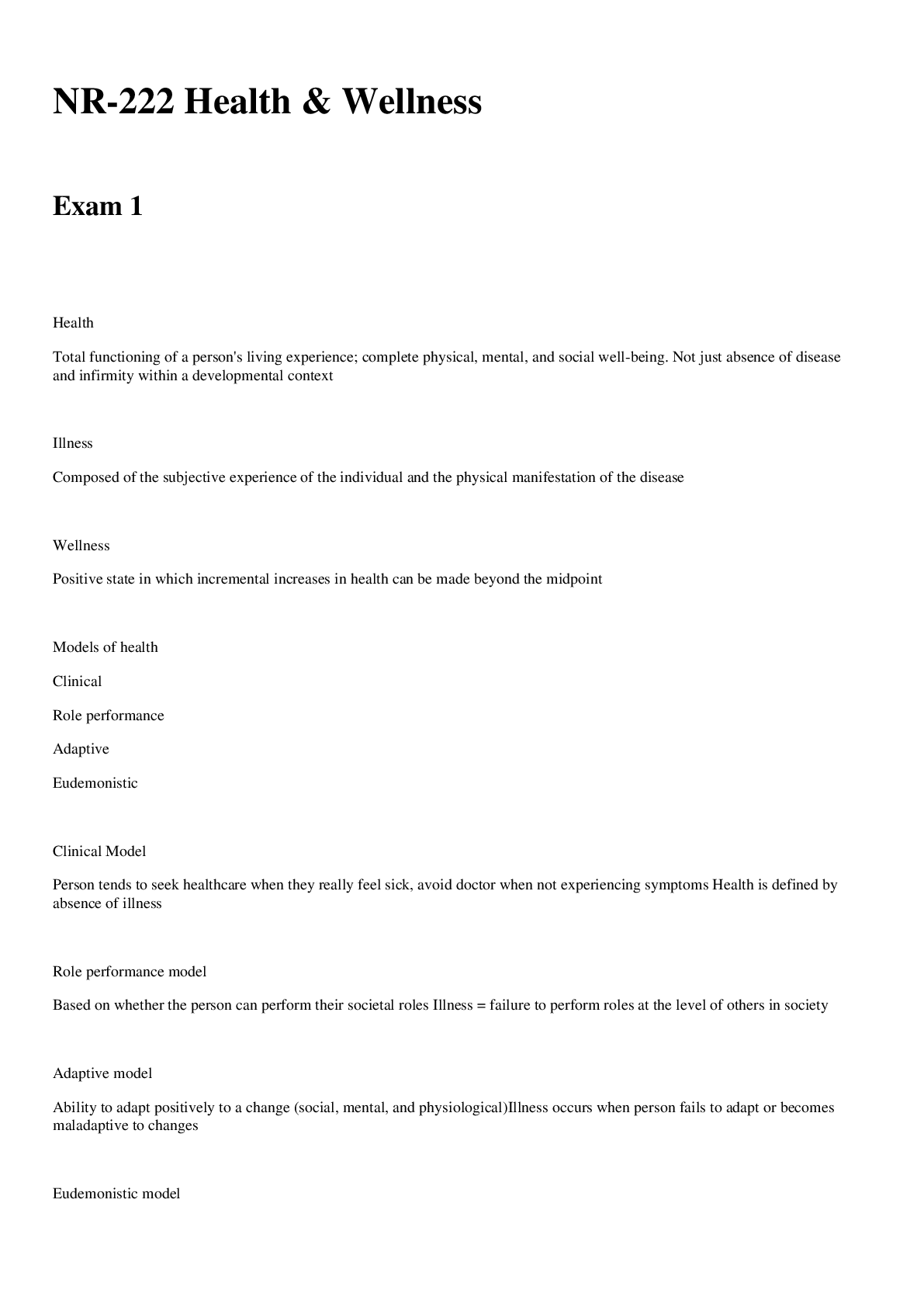
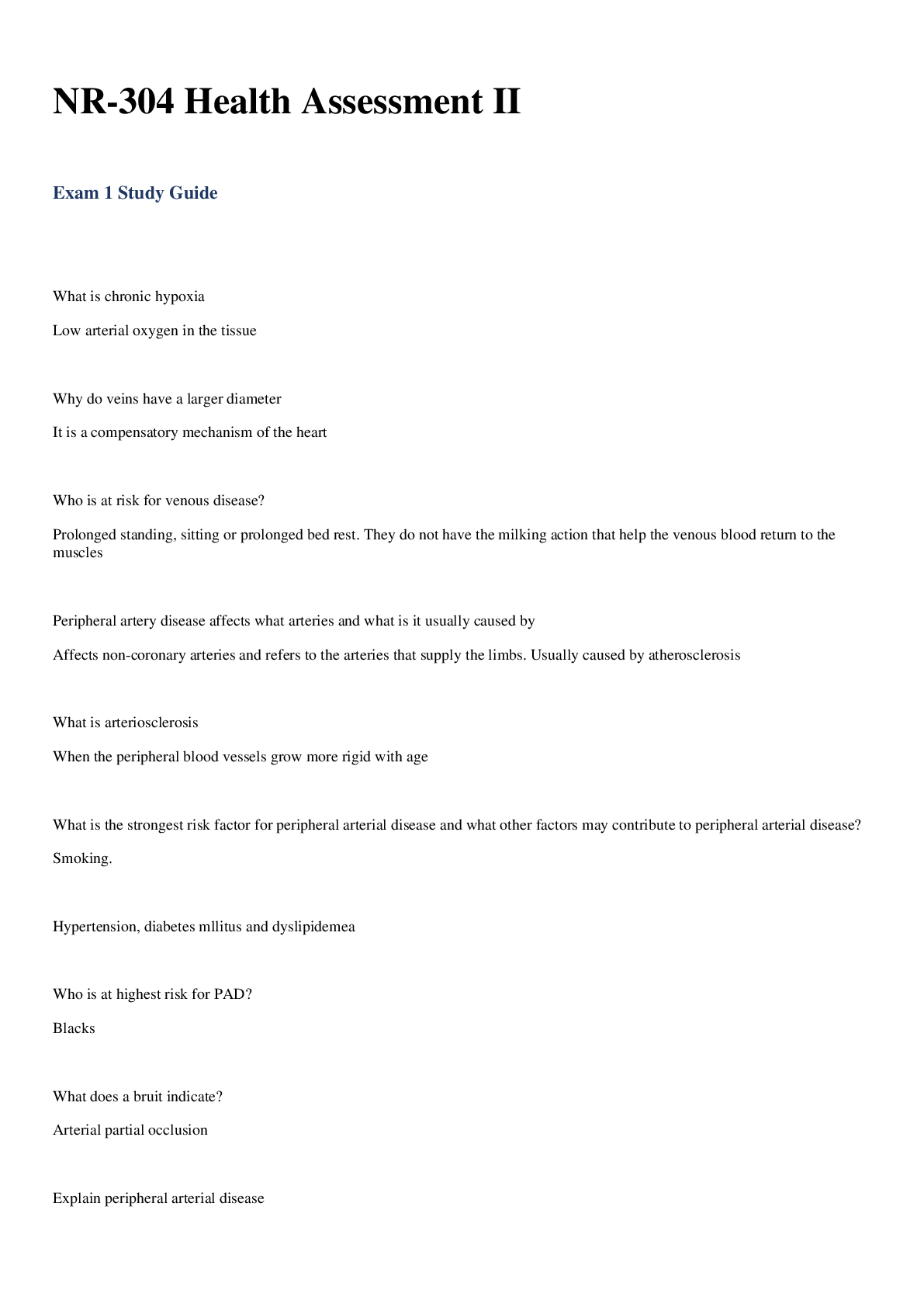
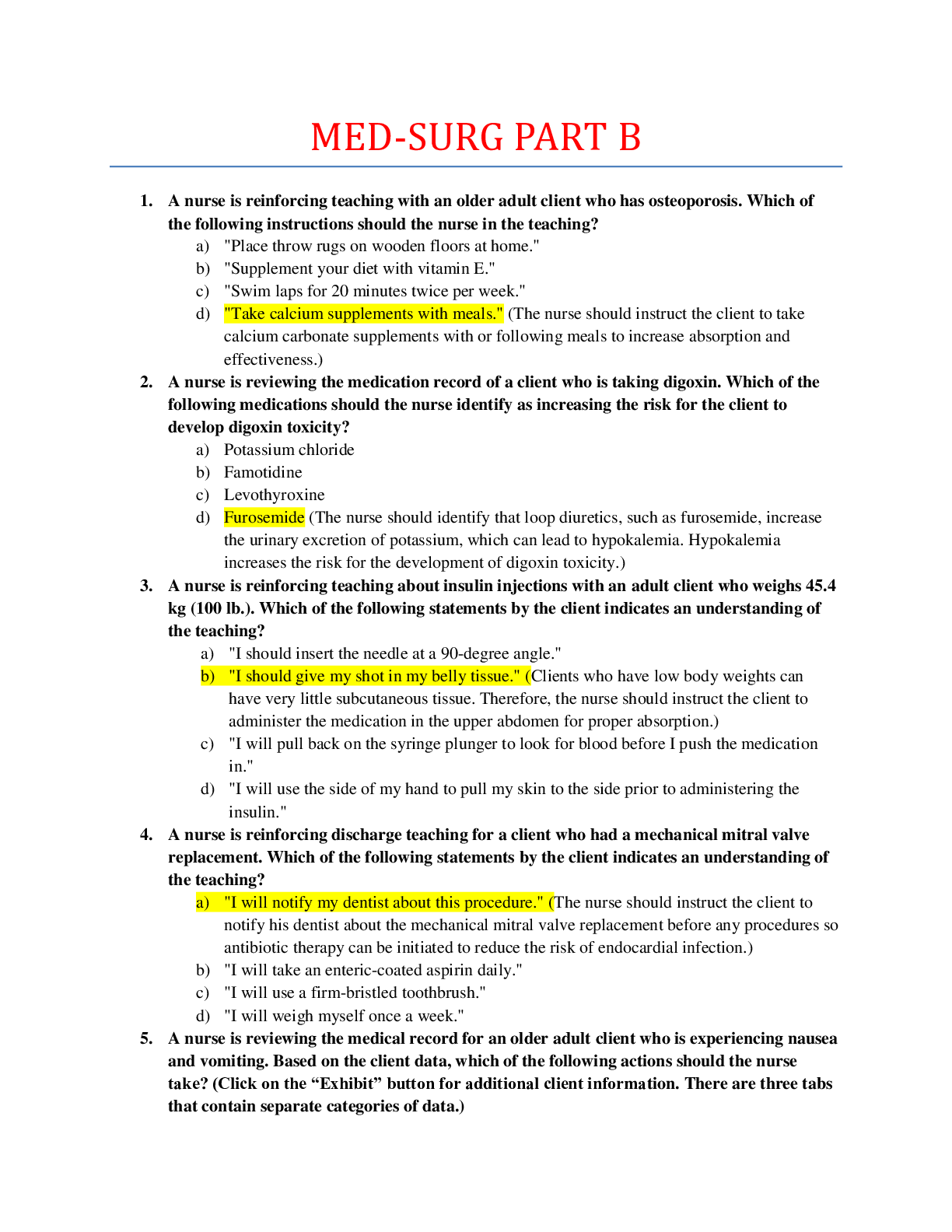
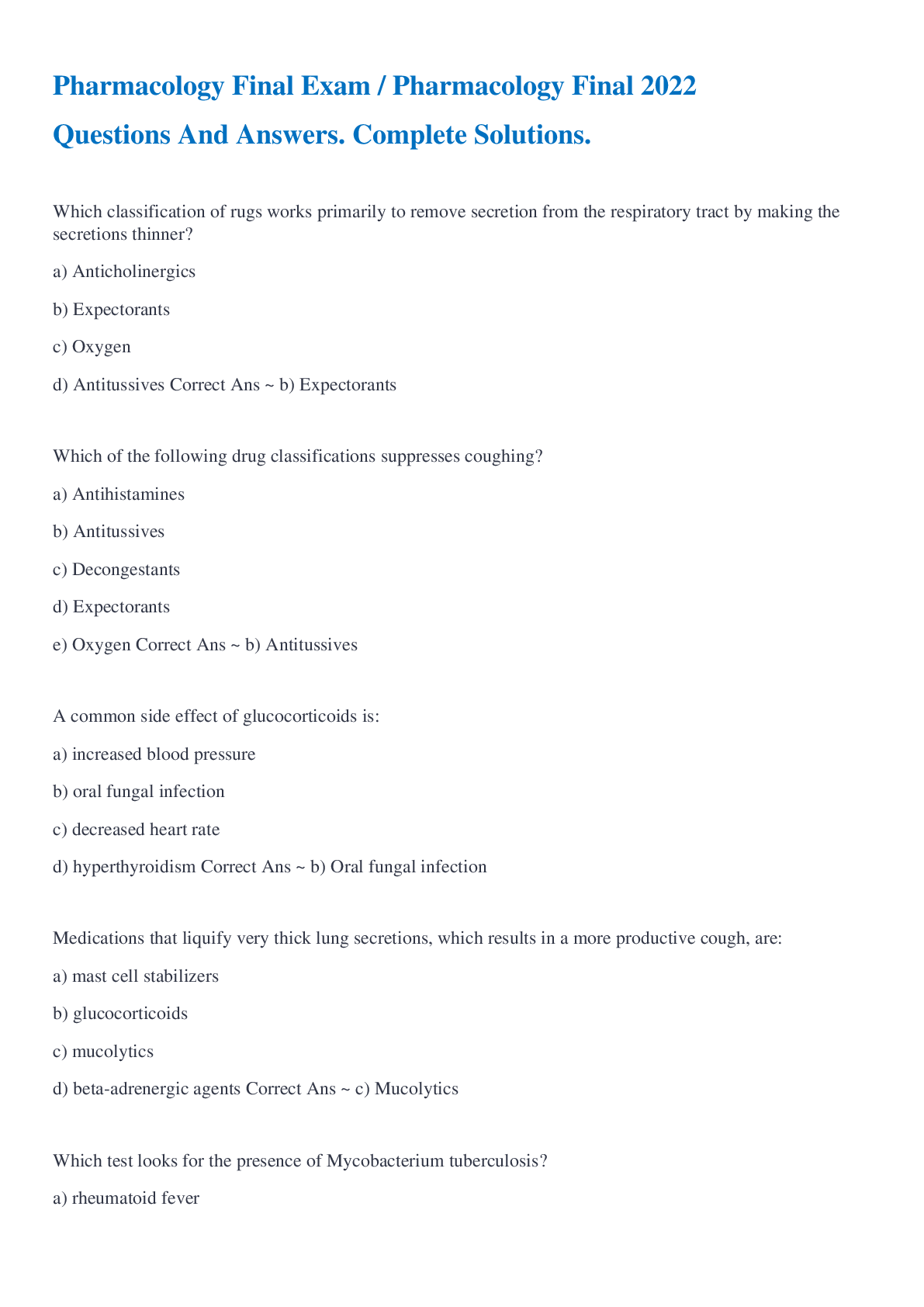
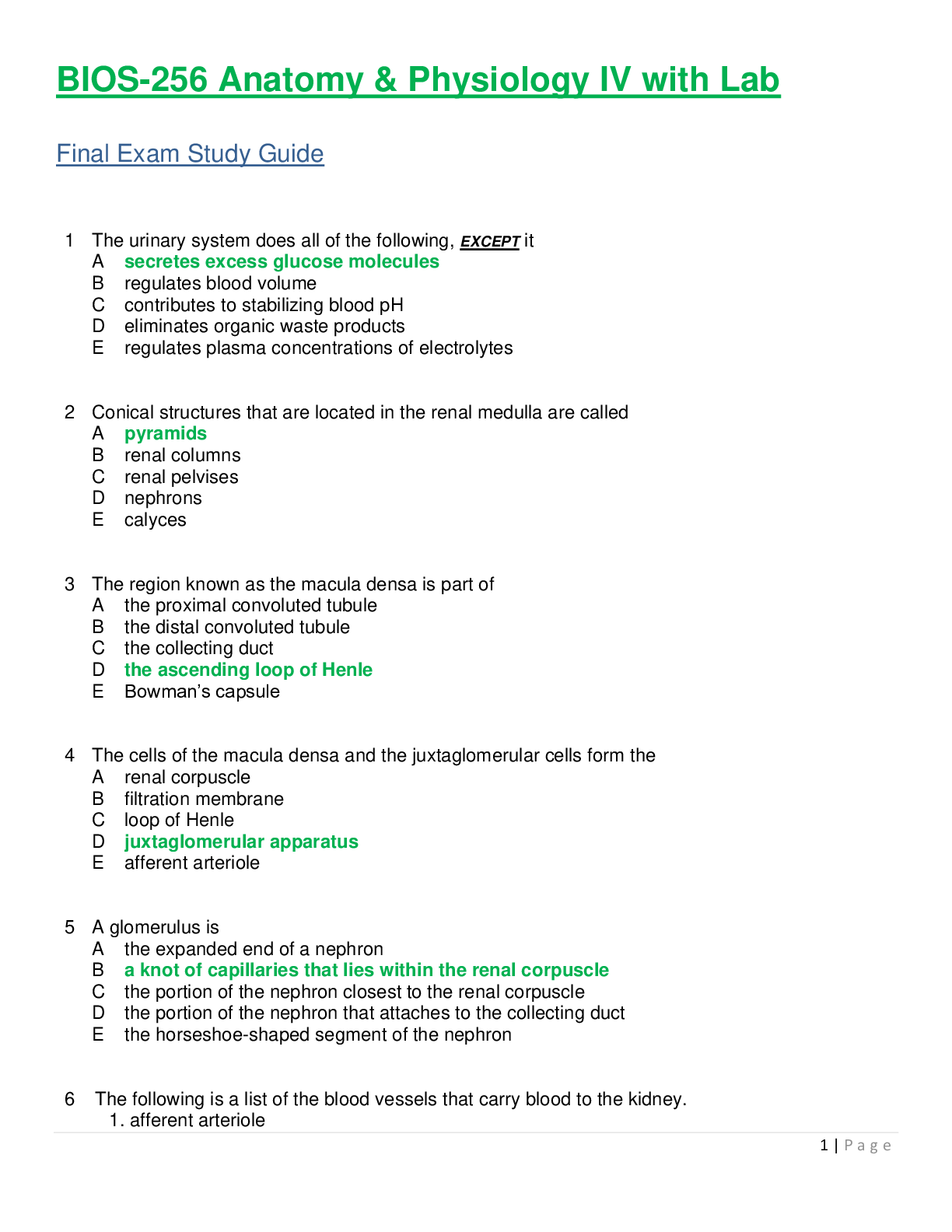
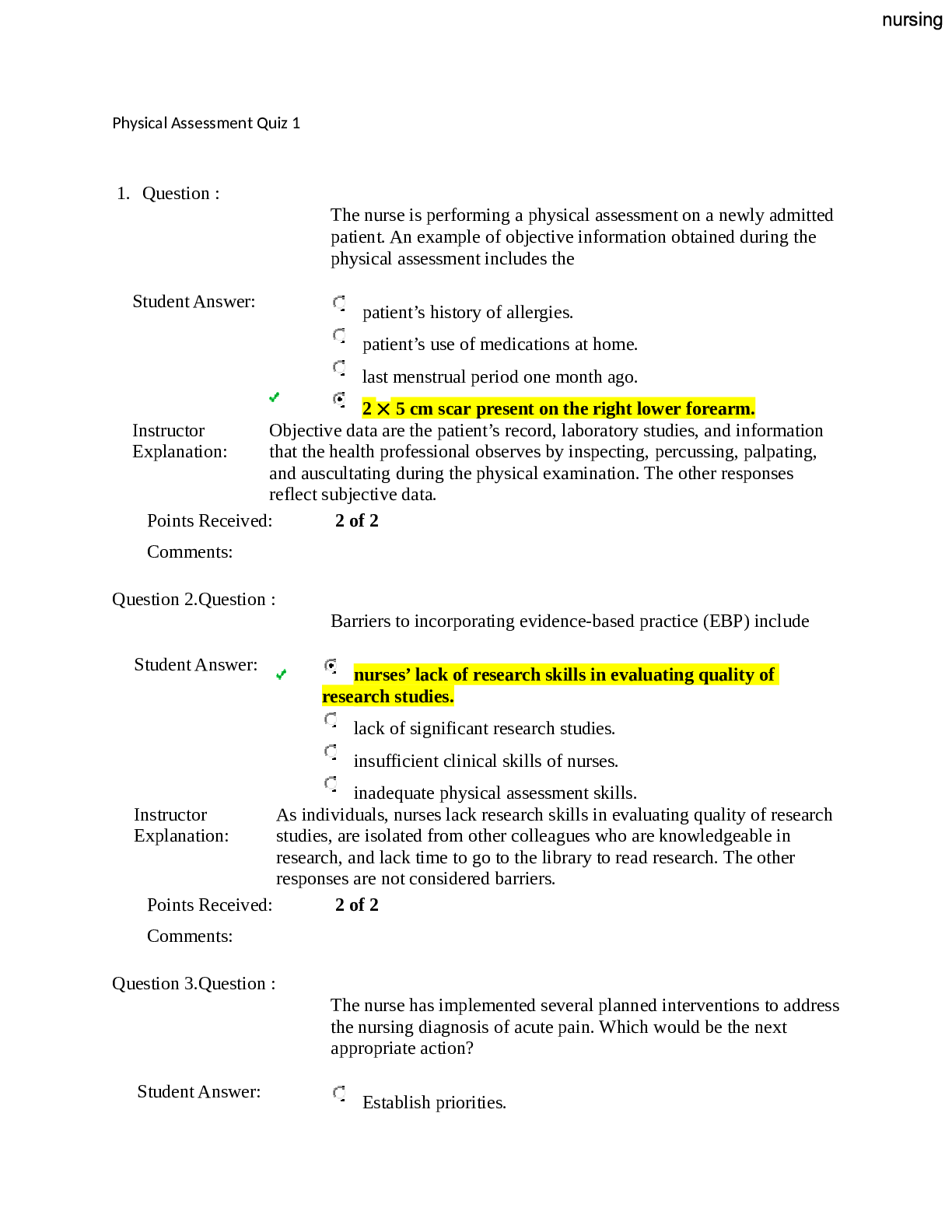
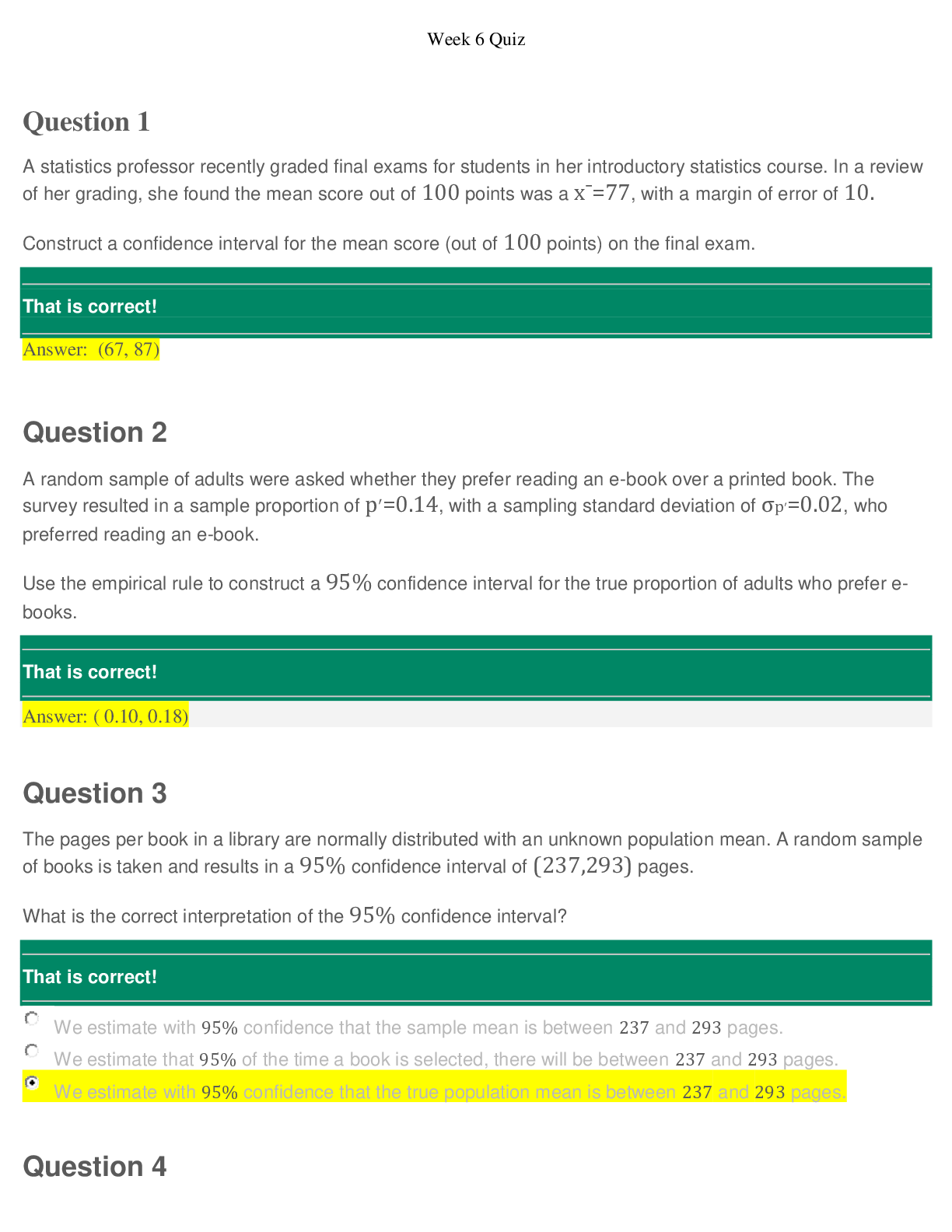
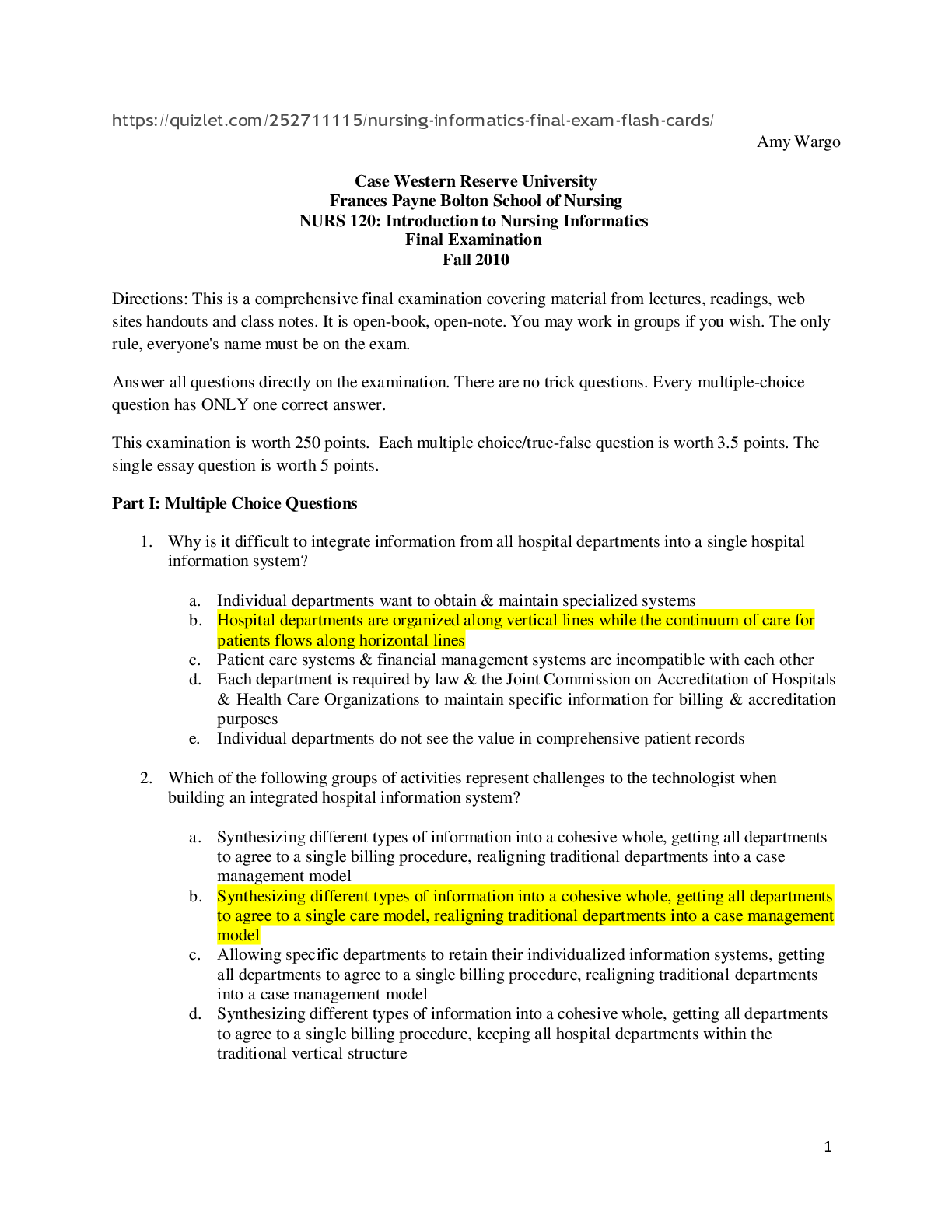
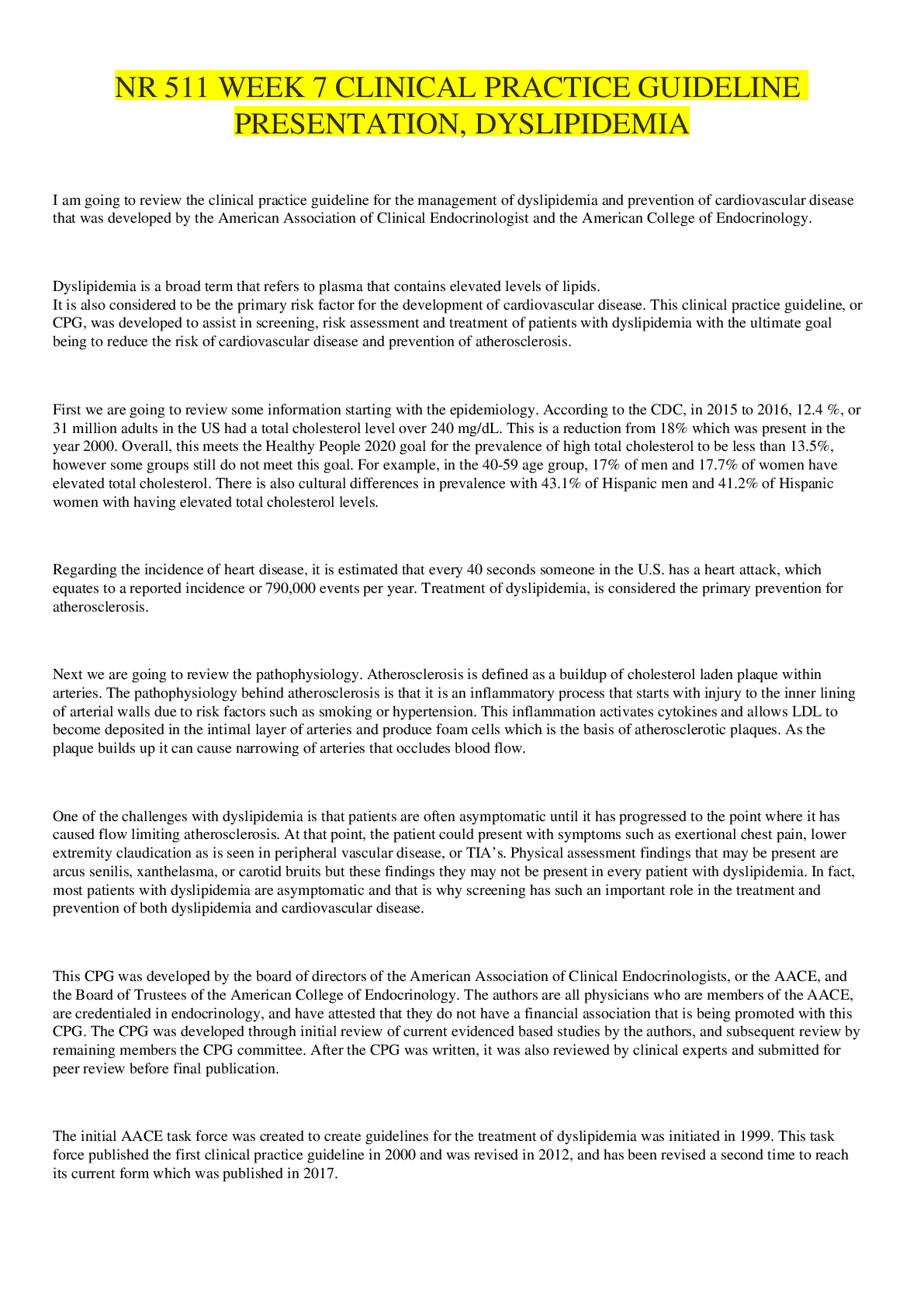
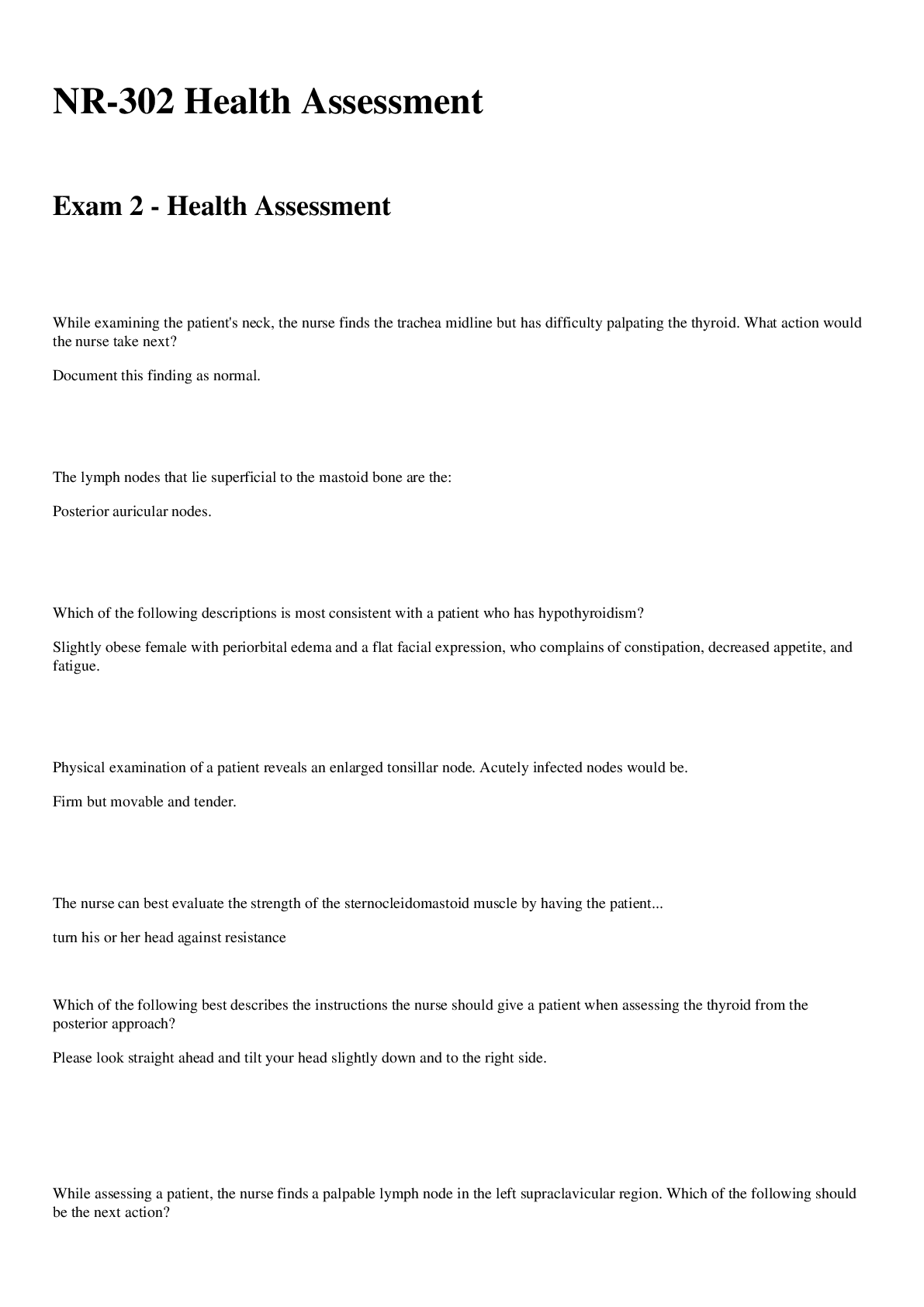
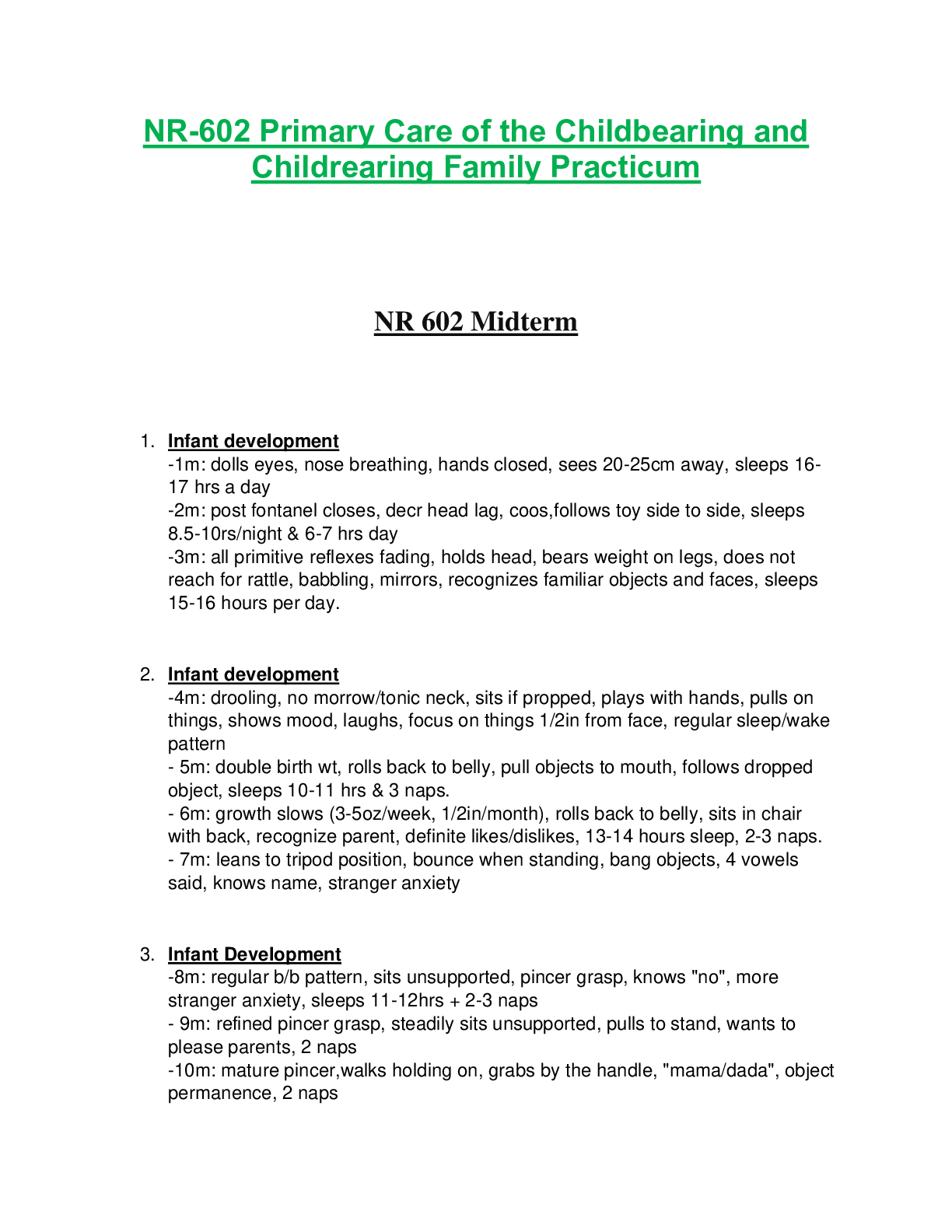
 – Chamberlain College of Nursing.png)

